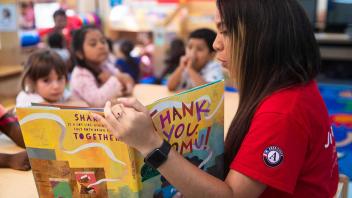Afterschool and Community Programs
Many Americans are energized by the challenge of helping all children learn to read. Committed citizens and public officials are attacking the problem head on, from the nation’s capital to statehouses to city halls, from libraries to pizza chains to ballparks.
Their work is informed by mounting research on how to achieve the best results. Activities touch on key issues-training teachers, reading to children, accessing books, and increasing support for parents and child care providers. There is consensus on the need to touch the lives of children who are the hardest to reach those who are the least likely to enter school ready to read and the most likely to complete third grade as poor readers.
Every member of the community has something to offer a child. Community groups can:
- Encourage the staff of your organization or the members of your group to volunteer as tutors to read with children. Contact literacy programs and offer volunteers. Encourage release time to allow staff to meet with students.
- Start an after-school or summer community reading program. Provide transportation for children and tutors. Offer your organization’s resources or building as a safe site in which the program can take place. Work with your local school to coordinate your efforts.
- Donate children’s books to an early childhood center or parent-child play group. Organize members to read to children each week.
- Sponsor trips to the local library. Provide transportation or escorts. Assist those with special transportation needs such as a wheelchair lift.
- Involve families in local reading efforts. Conduct community outreach in stores, clinics, and communities of faith. Use the print, radio, and TV media. Take information about local reading programs into the schools. Involve families whose children have special needs.
- Work with reading specialists from your school system, college, or library to obtain training. Request assistance from your school district’s special education office for volunteers working with students who have learning challenges.
- Hold an essay or speech contest among local children on the topic of “How Reading Has Made a Difference in My Life.” Offer a small prize related to literacy, such as a reference book or a bookstore gift certificate.
- Cooperate with other community organizations and school staff on reading activities for students. Contact other reading programs and school staff for guidance.
- Find high-quality books for a wide age range that reflect the interests of children in your community. Offer these in the form of book lists or donate actual books to your local reading program. Offer to supplement the reading with related activities.
